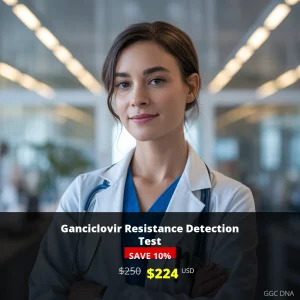t(9;11)(p21.3;q23.3) MLL-AF9 PCR Qualitative Test
Understanding the MLL-AF9 Genetic Test
The t(9;11)(p21.3;q23.3) MLL-AF9 PCR Qualitative Test represents a cutting-edge molecular diagnostic approach for detecting specific genetic abnormalities in leukemia patients. This sophisticated test identifies the presence of the MLL-AF9 fusion gene, which results from a chromosomal translocation between chromosomes 9 and 11. This genetic rearrangement is clinically significant as it plays a crucial role in the development and progression of certain types of acute myeloid leukemia (AML).
At General Genetics Corporation, we utilize state-of-the-art Real-Time PCR technology to provide accurate and reliable detection of this critical genetic marker. Our testing methodology ensures high sensitivity and specificity, enabling healthcare providers to make informed decisions about patient care and treatment strategies.
What Does the Test Detect?
The MLL-AF9 PCR Qualitative Test specifically identifies:
- The presence of the MLL-AF9 fusion gene resulting from t(9;11) translocation
- Genetic abnormalities at chromosomal bands p21.3 on chromosome 9 and q23.3 on chromosome 11
- The fusion between MLL (Mixed Lineage Leukemia) gene on chromosome 11 and AF9 (ALL1-fused gene from chromosome 9)
- Specific genetic markers associated with AML with monocytic differentiation
Who Should Consider This Test?
Clinical Indications and Symptoms
This test is recommended for individuals presenting with:
- Newly diagnosed acute myeloid leukemia, particularly with monocytic features
- Unexplained cytopenias (low blood counts) including anemia, thrombocytopenia, or neutropenia
- Persistent fatigue, weakness, or unexplained bruising
- Recurrent infections or fever of unknown origin
- Bone pain or tenderness
- Enlarged lymph nodes, spleen, or liver
- Patients with previous abnormal blood counts or bone marrow findings
Patient Populations
- Adults and children with suspected or confirmed AML
- Patients being evaluated for leukemia classification
- Individuals requiring prognostic assessment for treatment planning
- Patients being monitored for minimal residual disease after treatment
Benefits of Taking the MLL-AF9 Test
Undergoing the t(9;11)(p21.3;q23.3) MLL-AF9 PCR Qualitative Test provides numerous clinical advantages:
Diagnostic Precision
- Accurate confirmation of AML subtype classification
- Enhanced diagnostic specificity beyond conventional cytogenetics
- Early detection of genetic abnormalities that may not be visible through standard methods
Treatment Guidance
- Informs targeted therapy selection based on genetic profile
- Helps determine appropriate intensity of chemotherapy
- Guides decisions regarding stem cell transplantation
Prognostic Value
- Provides important prognostic information for treatment planning
- Helps predict response to specific therapeutic approaches
- Supports long-term disease management strategies
Understanding Your Test Results
Positive Result
A positive test result indicates the presence of the MLL-AF9 fusion gene. This finding:
- Confirms the diagnosis of AML with specific genetic characteristics
- Suggests a particular biological subtype of leukemia
- May influence treatment intensity and duration decisions
- Provides valuable information for monitoring treatment response
Negative Result
A negative test result indicates the absence of the MLL-AF9 fusion gene. This finding:
- Helps exclude specific AML subtypes associated with this translocation
- May suggest alternative genetic abnormalities requiring further investigation
- Supports consideration of different treatment approaches
- Provides baseline information for future monitoring
Clinical Interpretation
It’s essential to understand that test results should always be interpreted by a qualified hematologist or oncologist in the context of your complete clinical picture, including physical examination findings, blood counts, and other diagnostic tests.
Test Pricing and Details
| Test Component | Details |
|---|---|
| Test Name | t(9;11)(p21.3;q23.3) MLL-AF9 PCR Qualitative Test |
| Discount Price | $126 USD |
| Regular Price | $162 USD |
| Sample Type | 3 mL (2 mL min.) whole blood / Bone marrow in 1 Lavender Top (EDTA) tube |
| Turnaround Time | Sample Monday/Thursday by 11 AM; Report Wednesday/Saturday |
| Shipping Instructions | Ship refrigerated. DO NOT FREEZE |
| Mandatory Requirement | Clinical history is mandatory |
Nationwide Testing Availability
General Genetics Corporation provides comprehensive genetic testing services across the United States. We have established testing facilities and collection centers in major metropolitan areas including:
- New York City and surrounding areas
- Los Angeles and Southern California
- Chicago and the Midwest region
- Houston and Dallas in Texas
- Miami and Florida locations
- Philadelphia and the Northeast corridor
- San Francisco Bay Area
- Washington D.C. and Baltimore
- Atlanta and the Southeast region
- Phoenix and Arizona locations
Our network of certified collection centers ensures convenient access to testing services regardless of your location. We work closely with healthcare providers to coordinate sample collection and ensure proper handling of specimens.
Take Action Today
Early detection and accurate genetic characterization are crucial for effective leukemia management. The t(9;11)(p21.3;q23.3) MLL-AF9 PCR Qualitative Test provides essential information that can significantly impact your treatment journey and long-term outcomes.
Ready to schedule your test? Contact our dedicated patient services team today to book your appointment or discuss any questions you may have about the testing process.
Call or WhatsApp: +1(267) 388-9828
Our genetic counseling specialists are available to provide guidance and support throughout the testing process. We understand that genetic testing can raise important questions, and we’re committed to providing clear, compassionate care every step of the way.
Don’t delay in obtaining the critical genetic information needed for your healthcare journey. Contact General Genetics Corporation today to schedule your t(9;11)(p21.3;q23.3) MLL-AF9 PCR Qualitative Test and take the first step toward personalized leukemia management.







